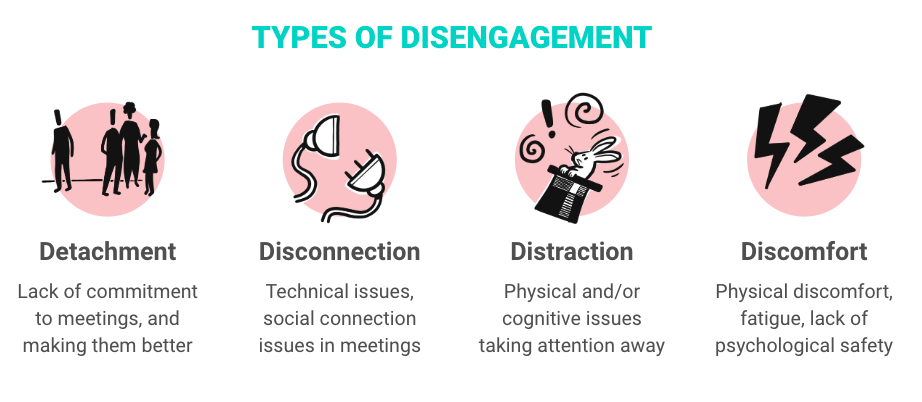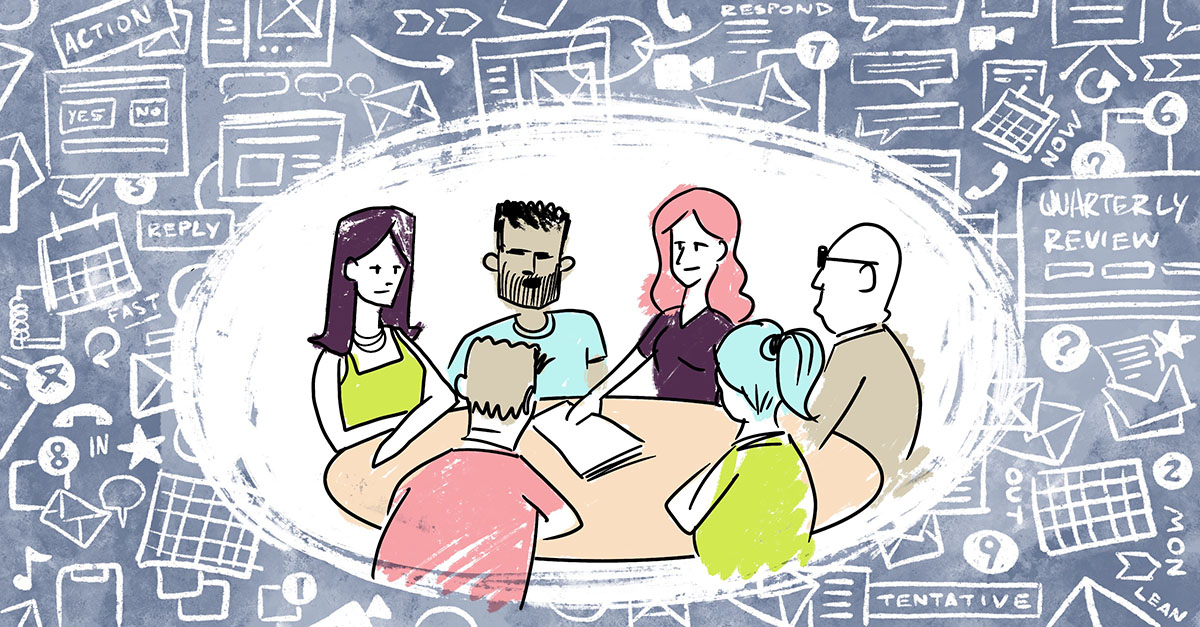As Will Schwalbe wrote in his book The End of Your Life Book Club, "The greatest gift you can give anyone is your undivided attention". You could think of the role of a meeting facilitator as a broker of attention, helping everyone to attend to one another, and to the topic at hand.
But as we all know, a lot of attention goes out the window when it comes to trying to keep it going within any meeting or workshop! Thinking about why people get disengaged first leads us to better ways to inject and sustain more attention.
Why people get disengaged
Before we jump into these tips, it's worth pinpointing why people get disengaged in the first place. In my research and experience, I've found there are four main drivers (4 Ds!) behind disengagement:
- Detachment - Boredom, cynicism, and lack of commitment to the topic, the other people, or to making the meeting better
- Disconnection - Technical issues of course yes, but also topic disconnection (lack of relevance or resonance) and social disconnection
- Distraction - Physical and/or cognitive issues taking attention away, especially in online and hybrid meetings
- Discomfort - Physical discomfort, fatigue, lack of trust and psychological safety, feeling "behind the 8-ball', lost or alienated

The main way we can improve engagement
I've included 16 tips for how to improve and sustain engagement in meetings below, but they all roll up to one main principle: set a tone for common ownership, and plan and act accordingly.
Everyone in your meeting should know that there are no passengers. We all attend to each other and to the topic at hand. If we don't make this clear, too many people will lean out.
Too pessimistic? Not at all. Especially with online and hybrid meetings, there are too many other factors that can get in the way of attending to each other and the topic, and we can't just hope that all your meeting attendees will do that. Achieving success in each and every meeting is too important to leave to hope. In the world of meetings, attention is the most precious thing anyone can give you, so invest in attention tactics that will give you an attention return.
In other words, anticipate, plan and act to turn those 4 Ds into these 4 Cs:
- Detachment → Commitment
- Disconnection → Connection
- Distraction → Concentration
- Discomfort → Comfort
In the world of meetings, attention is the most precious thing anyone can give you, so invest in attention tactics that will give you an attention return.
Tips for increasing commitment in meetings
- Send a clear agenda and outcomes with the meeting invitation. This is Meeting Hygiene 101 for a big reason: your attendees need to know what the outcome of your meeting is meant to be (and the output, too), and the agenda for how you're all going to get to that outcome.
- Link the intent and content of the meeting to their motivations. How does each person have "skin in the game'? What is important about the topic to them? Make this clear in your meeting invitation. Send separate messages in Slack to each attendee. Take a minute to help each attendee make the link to their skin in the game.
- Give people jobs to do. Whether it's before the meeting or during the meeting, think about ways you can involve your attendees. Even little things like asking someone to check in with everyone else to see if the temperature of the room is OK - and then adjusting it accordingly - are great for helping to get them attending. Who can take notes? Who can group sticky notes into themes? Who can help Glenn with his mic? Who can summarise the conversation into a sentence? There are endless opportunities to share the load.
- Inject a bit of drama. Remind everyone about why the meeting matters (before and/or during), and what might happen if we don't get to the outcome by the end of the meeting. Speak appreciatively about any healthy tension or urgency in the conversation.
Tips for increasing connection in meetings
- Use plenty of openers. Icebreakers are easy (not cheesy), fast, and insightful, and they work just as well online as in-person. A quick whip around the group to get answers on an intriguing question can help everybody get to know one another much better, as well as more relaxed, focused, and in the right mindset.
- Emphasise common goals. It's always helpful to say a quick word about how the goal of the meeting is resonant and relevant to everybody in that meeting.
- Pair and share. A sure-fire way to get everybody more connected, is to get everybody talking (just not all at once!). Consider using the "pair and share' method: Ask people to work and discuss in pairs (whether it's online or in-person), and share thoughts and ideas with each other. This is the perfect way to have deeper conversations at scale, because it works just as well whether there are 6 people or 600 people!
If it's important to gather the results of all these separate conversations, you can ask someone from each pair to share highlights with the broader group (whether it's all of them or just a few), or ask them to capture the highlights on sticky notes for everybody else to read and digest.
Tips for increasing concentration and focus in meetings
- Ask everybody to remove distractions. It's perfectly fine to ask everybody at the start of a meeting (especially an online or hybrid meeting) to put their phones away, and otherwise do what they can to ensure quiet distraction-free environment. It's all in the name of playing team, and attending to each other, and the topic at hand.
- Change it up. As Chip Heath and Dan Heath say in their book Made to Stick, "The most basic way to get someone's attention is this: Break a pattern". So many meetings are disengaging because they're just so dull. They're the same every. Single. Time. When things get too familiar, people tune out. So, look for ways to switch up how the meeting is run, what agenda and order of "moves' you use, who is in control, and so on.
- Time-box each part of your agenda. As long as you let everybody know beforehand, giving each task/question a set time - and sticking to it - really helps to maintain focus. If you think more time is needed at the end of the time-box, ask your group if they want more time, or to move on. Checking in with them in this way also helps sustain engagement because you're maintaining a tone of collective ownership.
- Ask questions. Seriously! There's nothing like a good question to help everybody focus. It's even better when you affirm each answer, verbally recall somebody else's answer, or gently ask people who aren't speaking up for an answer, or encourage others to ask questions as well.
- Help people analyse and reflect. Too many conversations in meetings are just waves of words swirling and pounding into each other, without much result. Ask exploratory questions (e.g. Why? How? What if? What else?) to help sift the details, compare, contrast, and explore. Ask reflecting and closing questions (e.g. How would we summarise this as a tweet? What decision have we made?) to get alignment, and focus on the essence.
Tips for increasing comfort in meetings
Hoo boy, this is a big topic, but here are some principles to consider:
- Be prepared. Try to find out people's personalities, and any interpersonal tensions that might exist before the meeting. An easy question to ask everybody prior to the meeting (individually) is "What do you think might get in the way of success?"
- Be inclusive. Ensure that your meeting is a level playing field for everybody, without favouring any one person or their situation. For this reason alone, consider if a hybrid meeting is actually creating a segregating experience for some attendees, and if you should all meet online or all in-person instead. Ensure that the language used is inclusive: explain any esoteric concepts, spell out any acronyms, and stay away from any jokes that might alienate some people, or make them uncomfortable.
- Be equitable. Ensure equal access to any materials and information needed. Most misalignment in meetings is due to some people withholding information from others, to try to gain an upper hand in decision-making. Ensure equal time on the mic and attention for all. Ensure equal access to - and familiarity with - any technology and software you're using.
- Help people listen to each other. Comfort comes with trust, and trust is built when people listen to one another. Demonstrate active listening. Spotlight and affirm what people are sharing, and verbally recall and connect to points previously made. There's nothing like being listened to, to increase your sense of commitment, connection, focus, and comfort!
So, the next time you get a vibe in your meeting that there is a lack of engagement, quickly analyse what you think is driving that disengagement:
- Detachment?
- Disconnection?
- Distraction?
- Discomfort?
Then, think to yourself: what can I do to turn the D into a C:
- Commitment
- Connection
- Concentration
- Comfort
I hope these 16 tips help. :)
